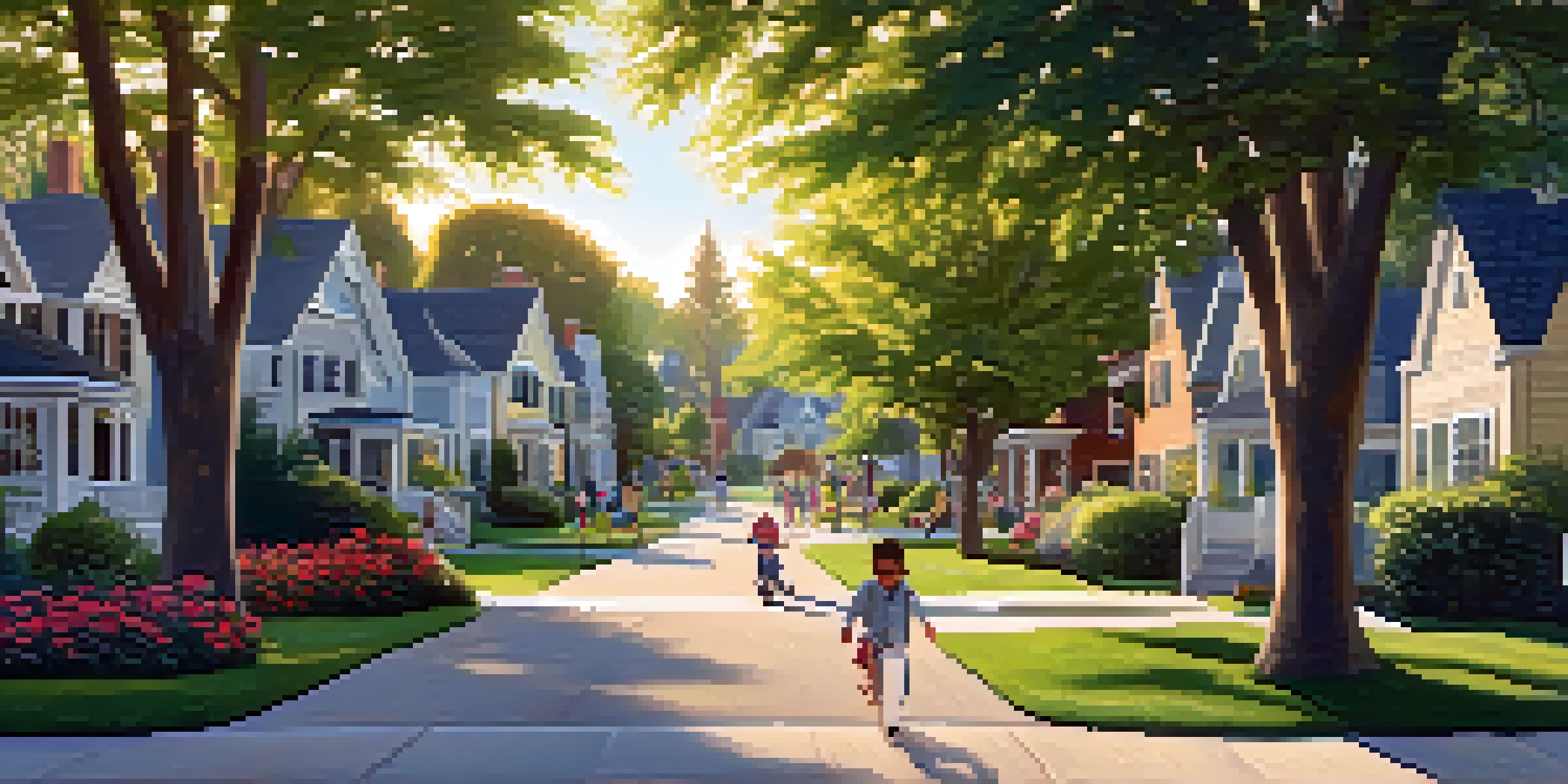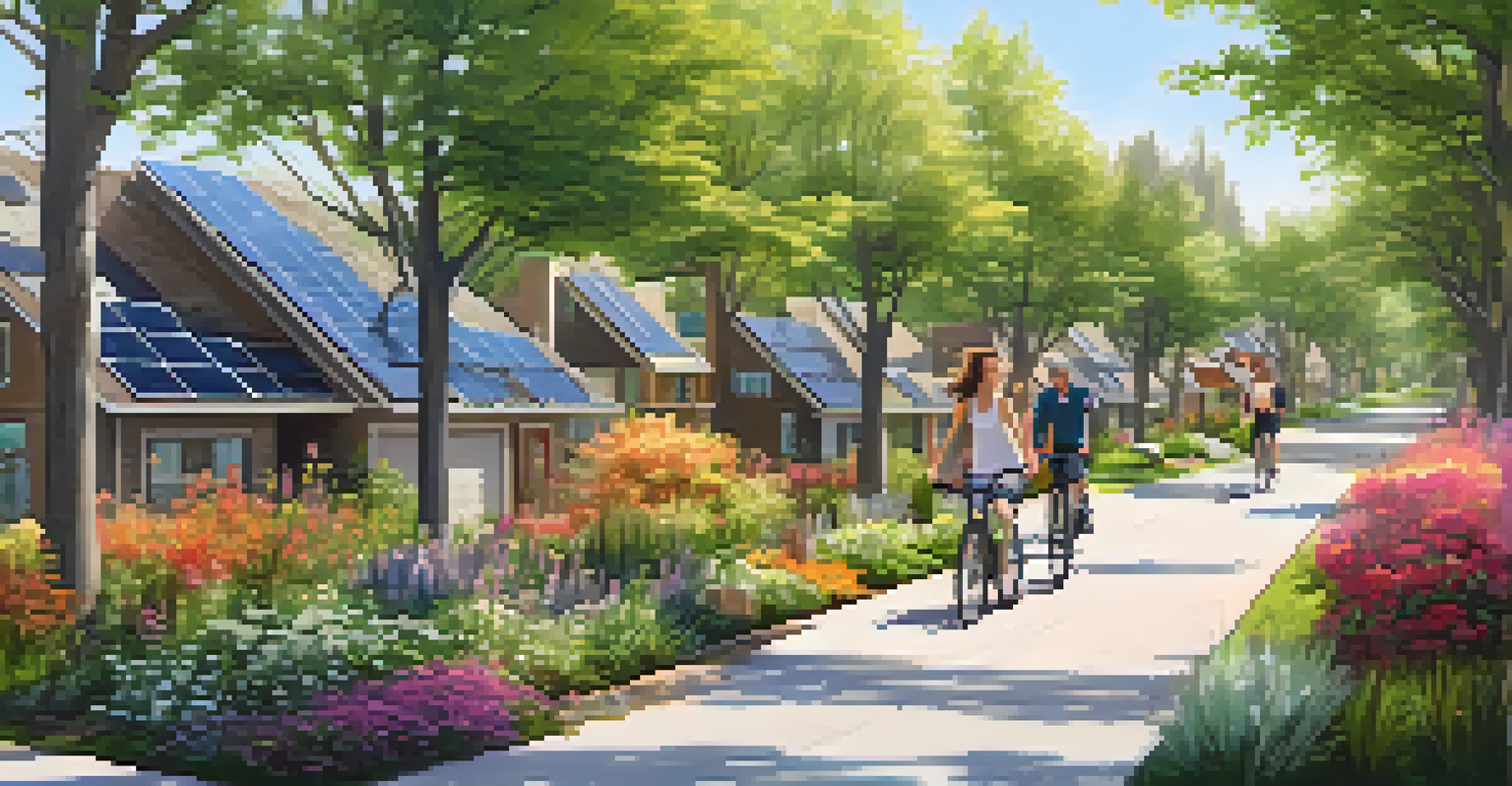How Community Development Affects Property Valuation

Understanding Property Valuation Basics
Property valuation is the process of determining the worth of real estate. This value can fluctuate based on various factors, including location, condition, and market demand. Essentially, it's like appraising a piece of art; its value can change based on the surrounding context.
Real estate is about location, location, location.
A key aspect of property valuation is the concept of comparables, or 'comps'. These are similar properties in the area that have recently sold, offering a benchmark for valuing a property. Just as an artist's work might be evaluated against similar pieces, a property's value is often assessed against its neighbors.
Ultimately, the goal is to reach a fair market value, which reflects what buyers are willing to pay. Understanding these basics sets the stage for how community development can significantly impact property valuation.
The Role of Community Amenities in Valuation
Community amenities, like parks, schools, and shopping centers, play a crucial role in property valuation. Imagine living near a beautiful park; this not only enhances your quality of life but also increases the appeal of your home. Properties close to such amenities often see their values rise as families prioritize convenience.

Moreover, amenities can enhance the overall desirability of a neighborhood. For instance, a well-rated school district can be a major selling point, leading to higher property values. Just like a well-maintained garden can elevate the facade of a house, community amenities can uplift the entire area’s worth.
Community Amenities Boost Value
Proximity to parks, schools, and shopping centers increases property appeal and market value.
Thus, when assessing property value, the presence and quality of community amenities are significant indicators of worth. They can transform a neighborhood from average to highly sought-after, attracting buyers and driving up prices.
Impact of Local Economic Development Initiatives
Local economic development initiatives, such as new businesses or infrastructure projects, can boost property values. When a new company opens its doors in a community, it often brings jobs and additional services, making the area more attractive. Think of it like a new restaurant opening up; it draws people, which increases foot traffic and interest in the neighborhood.
The best investment on Earth is earth.
These initiatives can create a ripple effect, enhancing the local economy and improving property values. As the area becomes more vibrant, existing properties may also see an uptick in their worth. Just as a rising tide lifts all boats, a thriving local economy can elevate property valuations across the board.
In essence, the health of the local economy is a critical factor in property valuation. Communities that invest in economic development usually enjoy increased property values as a result.
The Influence of Neighborhood Safety on Property Values
Safety is a paramount concern for homebuyers, making it a significant factor in property valuation. A neighborhood known for its low crime rates often has higher property values than areas with safety concerns. Picture a safe, friendly street where children can play; this sense of security can be incredibly appealing to potential buyers.
Communities that prioritize safety through active neighborhood watch programs or public safety initiatives tend to see positive impacts on property values. Just as a well-lit street can deter crime, a community's efforts toward safety can enhance its overall appeal.
Economic Development Raises Prices
Local initiatives that attract businesses and jobs enhance the overall desirability and value of properties.
Thus, when considering property value, the perception and reality of neighborhood safety cannot be overlooked. A safe community not only attracts buyers but can also lead to higher property valuations.
Urban Planning and Its Effects on Property Value
Urban planning, which involves the organization of land use and infrastructure, significantly affects property values. A well-planned community with efficient transportation and strategic zoning can enhance accessibility, making properties more desirable. Think of it like a well-organized library; when everything is in its place, it’s more inviting and functional.
Conversely, poorly planned areas may struggle with congestion or lack of services, which can negatively impact property values. For example, if a new high-rise is built without adequate infrastructure, it might lead to overcrowding and frustration among residents, deterring potential buyers.
Therefore, effective urban planning is essential for maintaining and boosting property values. Communities that invest in thoughtful development often see their property values flourish as a result.
The Effect of Community Engagement on Valuation
Community engagement is about residents actively participating in local decision-making, and it can greatly influence property valuation. When residents feel connected and invested in their community, it fosters a sense of pride and ownership. Just like a well-loved garden that thrives with care, engaged communities often flourish, attracting homebuyers.
Moreover, engaged communities are typically more proactive in addressing issues and improving local amenities. This can lead to a better quality of life and, subsequently, increased property values. Imagine neighborhoods where residents come together to organize events or clean-up days; such initiatives can enhance the community's appeal.
Safety Enhances Property Appeal
Neighborhoods with low crime rates are more attractive to buyers, leading to higher property valuations.
In short, community engagement is a catalyst for positive change that can elevate property values. When residents are involved, it often leads to a more vibrant and attractive neighborhood.
Environmental Factors and Their Impact on Property Value
Environmental factors, such as green spaces and sustainable practices, increasingly influence property valuation. Homes near parks or nature reserves often command higher prices due to the lifestyle benefits they offer. Picture a serene home surrounded by trees; it’s not just about the house but the lifestyle that comes with it.
Additionally, communities focused on sustainability and environmental health may attract eco-conscious buyers, further boosting property values. For instance, neighborhoods that implement recycling programs or green building initiatives can appeal to those seeking environmentally-friendly living options.

Thus, the environmental landscape of a community can play a significant role in property valuation. As more buyers prioritize sustainable living, properties in eco-friendly areas are likely to see increased demand and value.
Conclusion: The Interconnection of Community and Value
In conclusion, community development and property valuation are intricately linked. The quality of a neighborhood, including its amenities, safety, and engagement, directly impacts the worth of properties. Just as a beautifully designed home can stand out in a crowded market, a well-developed community enhances property appeal.
As we’ve seen, various factors, from local economic initiatives to environmental considerations, play crucial roles in shaping property values. Each element contributes to the overall desirability of an area, influencing buyer decisions and investment potential.
Ultimately, understanding the connection between community development and property valuation can help homeowners, investors, and policymakers make informed decisions. By investing in community growth, we not only enhance our neighborhoods but also boost property values, creating a win-win scenario for all involved.